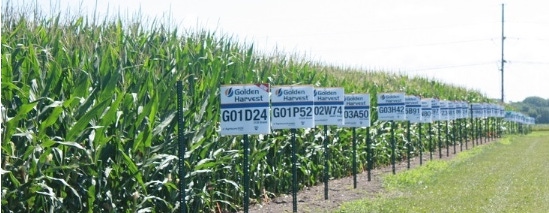April 4, 2018

Editor’s Note: This company media release is unedited, for your information.
Deeply rooted in genetics, agronomy and service, Golden Harvest® seeds will be a major benefactor of Syngenta's incremental $400 million investment over the next five years. The investment will strengthen the diverse Golden Harvest product portfolio, enhance service offerings and further demonstrate its commitment to farmers. This funding is in addition to the $1.3 billion the company already invests in research and development (R&D) annually.
“With the mega-merger industry consolidations happening and market prices where they are today, it’s more important than ever to provide farmers with differentiated hybrids and varieties, as well as exceptional service,” said David Hollinrake, President, Syngenta Seeds, LLC and North America Region Director. “Golden Harvest is committed to equipping farmers with customized seed options and the local agronomic knowledge they need to address the unique requirements of every field.”
Strengthening the portfolio
Built on a legacy of reliable performance against in-field challenges, Golden Harvest is expanding its strong seed portfolio to help farmers get the most yield out of every field. Golden Harvest will double its seed breeding staff, increase trial testing by one-third and increase new corn chassis by 58 percent, giving farmers an even more differentiated portfolio of hybrids and varieties to choose from.
“Golden Harvest corn and soybeans feature the latest genetics to boost performance in varying soil types, weather conditions and pest pressures,” said Hollinrake. “Starting with genetics and traits, the additional investment will provide farmers with more choice and more yield, in the Golden Harvest brand they can count on.”
The genetic potential of Golden Harvest corn is protected with the latest Agrisure® traits technology. Agrisure Viptera® is the only trait available today that effectively controls western bean cutworm, which is one of the most destructive pests to corn. No other trait in the industry provides better or more comprehensive above-ground insect control. And for farmers seeking to manage corn rootworm, the Agrisure Duracade® trait offers the latest control technology on the market. Farmers seeking ultimate insect control, simplicity and choice should consider planting Agrisure Duracade 5222 E-Z Refuge®, the most advanced trait stack on the market. Agrisure Duracade 5222 E-Z Refuge combines the Agrisure Duracade and Agrisure Viptera traits to offer premium, broad-spectrum control of 16 yield-limiting pests, with the convenience and simplicity of a 5% in-bag E-Z Refuge.
The Golden Harvest portfolio includes Enogen® corn hybrids in select geographies, which feature an in-seed innovation benefiting farmers marketing grain to ethanol plants and those producing grain or silage for livestock feed. A recent expansion of the Enogen footprint resulted in two new agreements with ethanol plants, bringing product marketability to 31 plants. This game-changing technology supports rural communities by keeping enzyme dollars local and helps make ethanol even more sustainable.
Increased field support
A deep commitment to genetics, agronomy and service is at the root of Golden Harvest. The additional investment will also boost field support, putting more boots on the ground to help farmers manage their crops throughout the entire growing cycle.
“Golden Harvest is in the process of hiring more agronomists, who will work alongside farmers to make sure the right genetics are placed on every acre,” said Bruce Battles, head of agronomy, seeds. “Considering today’s tough commodity market for corn and soybeans, it’s even more important to help the hardworking American farmer get as much return on investment as possible.”
Local, independent Golden Harvest Seed Advisors, who offer farmers the combination of advanced genetics, along with tailored agronomic knowledge, will also benefit from enhanced support.
“With expanded training and local data delivered in real-time, our Golden Harvest Seed Advisors will provide farmers with even more personalized field recommendations,” said Battles. “This will lead to a greater understanding of how seed genetics, soil types and farm management practices work in their environment.”
You May Also Like




